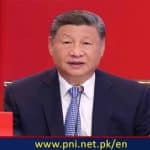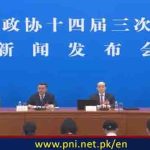BEIJING, Jun 25 (APP): The environmental protection and energy transition are prominently discussed topics at the ongoing 25th World Economic Forum in Dalian, China.During the sub-forum “Not Losing Momentum on the Energy Transition,” experts and business representatives from the United States and China exchanged views on these issues and reached a consensus: despite geopolitical challenges, energy transition faces numerous hurdles, and global cooperation is essential to eliminate non-technical barriers.
Amid the backdrop of Europe’s plan to impose tariffs on Chinese electric vehicles, Chinese entrepreneurs, as global leaders in the new energy industry, have shown an optimistic attitude, CEN reported on Tuesday.
Robin Zeng, Chairman of CATL, expressed that while all parties globally have their considerations in developing the new energy industry and remain uncompromising, business actions will inevitably evolve into geopolitical matters. Using a vivid analogy, he explained his perspective: “Just like the 4-3-3 formation commonly used in football, different regions of the world should leverage their comparative advantages and enhance cooperation.”
“When I discuss with our partners, I often say, let’s not be too greedy; let’s work together and share the results of our work. We can make some proportional adjustments, and that’s okay. The key is that we share our technology,” he emphasized. “We are developing this industry not just for ourselves, but for the global renewable energy industry.” He also believes that the friction between the new energy industries in the West and China is temporary.
Wen Shugang, Chairman of China Huaneng Group, shared a similar viewpoint: “Through technological leadership, we can enable people in regions and countries without resources to enjoy clean ‘light and heat’.” He believes that a new supply-demand relationship has formed between the enormous demand for low-carbon solutions and China’s low-cost feasible technological solutions.
Currently, approximately 80% of global energy consumption still relies on fossil fuels. When forecasting industrial development, Wen Shugang emphasized that China remains unwavering in its commitment to green and low-carbon development. “Despite the changing international landscape and varying reactions to the Paris Agreement, with some countries even withdrawing, the Chinese government is unwavering in its path toward green development.
” He added that once a goal is set, it will not change, and robust market competition has significantly spurred the development of the private sector.Wen later emphasized that companies need to achieve deep decarbonization.
“The future should be highly electrified. Judging from the power generation side, only about 20% of global electricity is used by end-users; in the future, fossil fuel consumption should decrease, and terminal electrification usage should increase.”
Robin Zeng on the other hand, succinctly encapsulated the core and key points of energy transition: “We are a zero-carbon factory, starting from now, can you drive an electric car? Can you turn your factory into a zero-carbon factory right now?”
Follow the PNI Facebook page for the latest news and updates.









